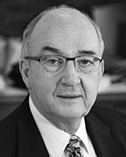Biosketch
Ernest M Wright is a Distinguished Professor of Physiology and the Mellinkoff Professor in Medicine at the David Geffen School of Medicine at UCLA. He was born in Belfast, Northern Ireland and graduated from the University of London in 1961 with a B.Sc in chemistry and physiology. He earned his PhD in physiology at the University of Sheffield in 1964 and a D.Sc. from the University of London in 1978. Following a fellowship in biophysics at Harvard he joined the faculty at UCLA in 1967, where he served as chair of the department of physiology from 1987 through 2000. Wright is recognized for his research on the physiology, biophysics, structure and genetics of human sodium glucose transporters. He is a fellow of the British Royal Society and a member of the German National Academy of Sciences (Leopoldina).
Research Interests
As an undergraduate student Wright became intrigued about the mechanism of active transport of molecules across the epithelial cells in the kidney and small intestine. Initially he followed this interest as a graduate student with David Smyth FRS at Sheffield where he studied glucose and amino acid transport across the intestine. He returned to this topic in his own laboratory at UCLA where he identified the proteins responsible for active glucose and amino acid transport (sodium co transporters), cloned the intestinal and renal sodium glucose cotransporters (SGLTs), and unraveled the defect in inherited intestinal glucose and galactose malabsorption (GGM). This work became part of the foundation for the pharmaceutical industry's success in developing novel drugs to treat diabetes, SGLT inhibitors. More recently he contributed to solving the structure of a sodium sugar cotransporter and a focus of his research is now to understand the atomic mechanism of sodium glucose cotransport. Another interest is the function of SGLTs throughout the human body where he is employing non-invasive imaging methods to monitor their activity in the brain, kidneys and cancer.


